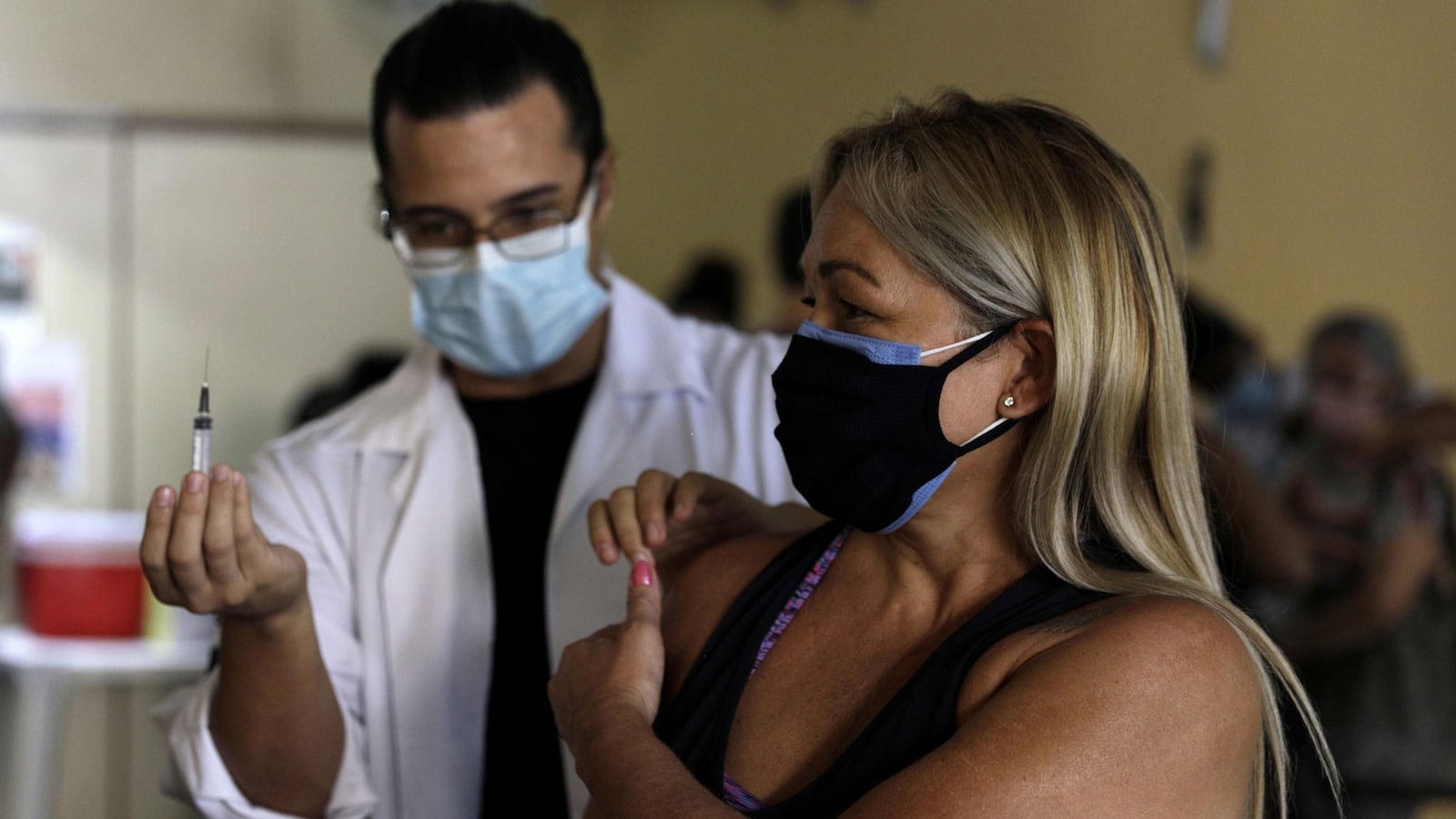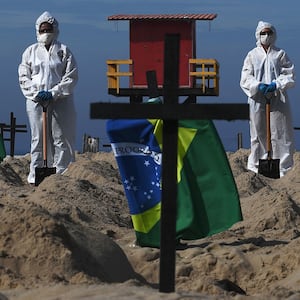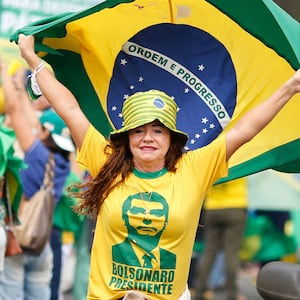RIO DE JANEIRO—Deep in the Brazilian Amazon, the Yanomami Indigenous people breathed a sigh of relief when COVID-19 vaccine doses were finally delivered. But then—shortly afterwards—illegal miners occupying the territory reportedly paid off two nurses in gold in exchange for jabs meant for Indigenous people.
Some 3,100 miles away, in a sleepy town in southeastern Brazil, a 48-year-old mayor and his wife were among the first to get vaccinated against COVID-19 early this year—ahead of doctors and even the elderly. And in the state of Paraná, 30 politicians are suspected to have been vaccinated secretly, even though they didn’t qualify for a shot.
Since Brazil began to vaccinate against COVID-19 this year, hundreds of the country’s rich and powerful have been suspected of skipping the vaccination line. Politicians, business moguls and social media influencers have all made headlines after going to great lengths to jump the queue.
“Each case is more bizarre than the last, it’s a total disregard for the rules,” said Dr. Paulo Lotufo, epidemiologist and professor at the University of São Paulo. “And some of them are even outing themselves by bragging on social media about being vaccinated.”
Line-jumping by the rich and powerful has come as Brazil grapples with one of the world’s deadliest COVID outbreaks. The virus has killed 442,000 people in the country, a toll second only to the United States. More than half have died this year alone as the pandemic has spiraled out of control, aided by highly-contagious strains and a failure to impose lockdowns.
Vaccination, meanwhile, has lagged amid a shortage of shots. Brazil—once a global leader in immunization—has been left scrambling for supplies, after far-right president Jair Bolsonaro turned down multiple early offers to buy doses from Pfizer and other manufacturers.
So far, just 9.4 percent of Brazilians have been fully vaccinated, with immunization still focused on priority groups like the elderly and those with existing illnesses.
“We’re working in the context of a shortage,” Lotufo said in an interview with The Daily Beast. “We have the infrastructure for mass vaccination. But the problem is that the Brazilian government missed the opportunity to buy a huge lot of vaccines.”
Brazil has one of the world’s largest universal health-care systems, which operates alongside a vast private sector accessible to those with insurance plans or the means to pay out of pocket. But the government has so far only made the vaccine available through its public network, immunizing health workers, the elderly and those with pre-existing conditions.
Still, those with power or money have tried to circumvent these rules and snag an early shot. In northeastern Brazil, a digital influencer got her COVID-19 jab ahead of priority groups when her husband put her name on a staff list at a private health clinic he owns.
And the line-jumping has only showcased the deep inequality that already plagued Brazil, explained Ana Maria Malik, a professor of health policy and management at the think-tank Fundação Getulio Vargas.
“It’s forced people to recognize the inequity in this country,” Malik told The Daily Beast “The way people have been trying to get first in line is absolutely ridiculous and unfair.”
Widespread fraud has sent authorities across Brazil scrambling to enforce the rules and hand out punishment to those cutting the line. Mayors and other public servants who have been caught have been removed from their posts, while business moguls guilty of jumping the queue have been fined thousands.
In Paraná, authorities have been grappling with a particularly intense wave of fraud. Last week, a woman posing as a nurse was imprisoned when authorities caught her selling stolen vaccines over Whatsapp . Nearly 100 fraudsters are also suspected of impersonating people who have already died to snag a vaccine. And, in one city, almost 500 doses of the vaccine were applied to people using the same 165 social security numbers.
The widespread reports of fraud prompted Paraná’s lawmakers to form a committee last month, tasked with investigating and punishing those who cut the vaccination line. Fernando Francischini, a state deputy who is spearheading the commission, says there have been nearly 800 reports of vaccination fraud so far.
“It’s absurd, the amount of abuse we’re seeing,” he told The Daily Beast in an interview. “Oftentimes, it’s young people cutting in line. And they’re taking away the opportunity from those who have comorbidities or are elderly.”
The commission hopes that it can send a firm message by going after those who are getting vaccinated fraudulently and repair the image of the vaccination campaign, Francischini said.
“It shows that there will be punishment and serves as an example of anyone thinking of cutting the line,” he said. “Because they know there will be repercussions.”
But attempts by the rich and powerful to score vaccines have not only remained in the shadows. Corporations and special interest groups—including judges—have been lobbying the federal government for months, asking for permission to buy their own vaccines directly from manufacturers.
Bolsonaro, who has long cast himself as a pro-business leader eager to “privatize everything,” has signaled support for such initiatives. He has said allowing companies to buy vaccines and immunize their employees would lead to savings for the government.
And it seems some of these lobbying efforts have paid off. Last month, Brazil’s Senate moved forward with a bill that would allow corporations to buy vaccines privately, as long as they donate half of the supplies they purchase to Brazil’s public health network.
“We are at war,” said Arthur Lira, the leader of the chamber and a staunch ally of Bolsonaro. “And in war, anything goes to save lives.” Lawmakers will now review the bill, which would allow companies to buy doses even before the government has finished vaccinating priority groups.
Yet critics warn that allowing corporations to buy their own vaccines will only deepen the inequity that already exists in Brazil. They note it would mean a healthy Brazilian working for a large company could end up getting vaccinated before an elderly person with a medical condition who relies on the public health-care network.
“It’s just not fair to be able to get immunized because you happen to work for a rich employer,” Malik said. “It’s a matter of priority. We have populations that are in danger. So it’s unethical to take those doses away from them.”
Allowing the private sector is especially problematic because there already aren’t enough doses for groups that run the greatest risk of dying of COVID-19, Lotufo said. Opening up vaccines to the private sector could create an even more intense scramble for vaccines that could lead to a price spike.
“We don’t have a surplus,” Lotufo said. “If there were enough vaccines, we would be able to vaccinate everyone. We could vaccinate two million people per day. But, for now, these vaccines don’t exist.”



